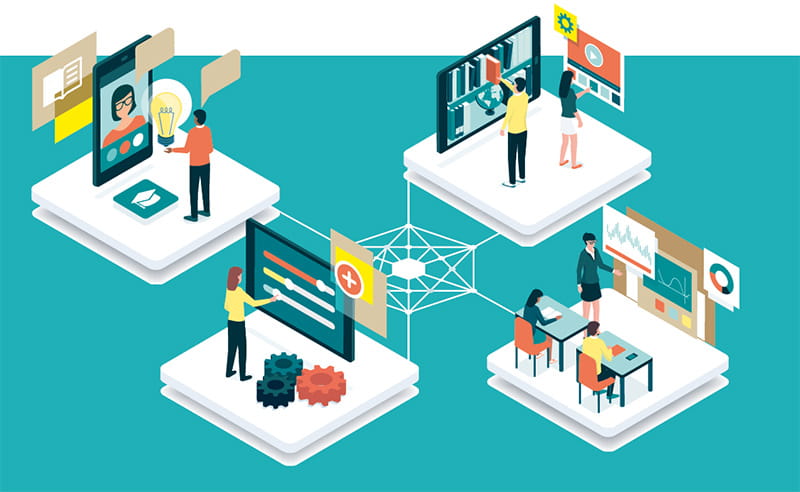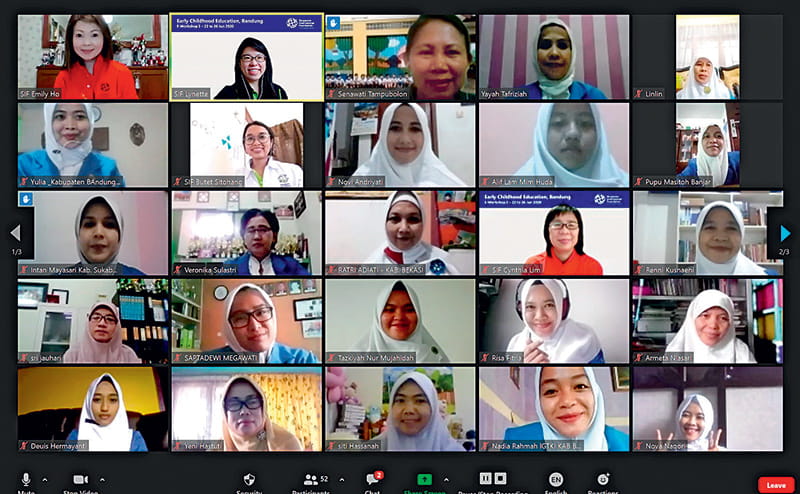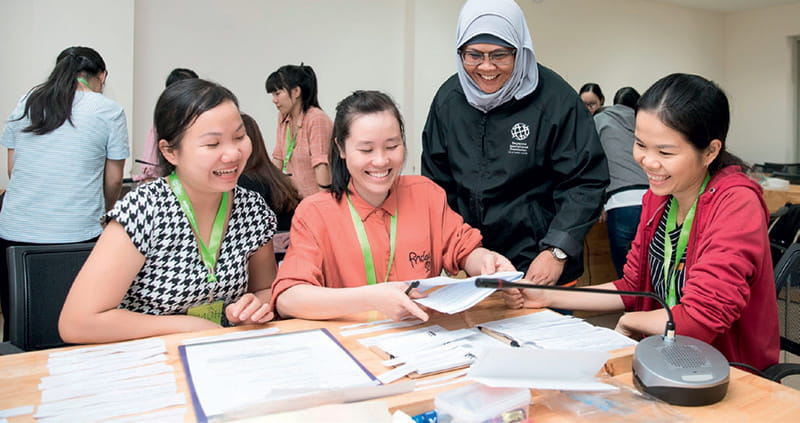Stories > The Future of Volunteering
The Future of Volunteering
Technology is enabling international volunteer organisations to tackle training and capacity-building challenges brought on by the ongoing pandemic and global travel restrictions.
BY JAMES O'BRIEN
t is hard-wired in all of us, as social beings, to connect with each other. While Covid-19 has self-isolated billions of people, it has prompted millions to volunteer in many innovative ways – from making face masks and helping elderly neighbours with shopping to holding virtual concerts and conducting pilates classes.
Despite the coronavirus, volunteering for others has continued to thrive as people find new means of connecting and giving their time and skills.
The pandemic has seen international volunteer cooperation organisations, or IVCOs, repatriate thousands of volunteers from hundreds of countries. It has been an unprecedented logistical feat in unprecedented times. Many international volunteers who are strategically important for the Covid-19 response remained in their placements. Now, IVCOs are adapting their work so they can continue to support partner organisations and communities overseas and thinking about when and how they can safely deploy essential volunteers.
LENDING A HELPING HAND
The United Nations estimates that one billion people volunteer every year, giving their time to help their own communities or those abroad. Added to this, the pandemic has sparked a surge in volunteering at the local level. Millions are sharing their time, skills and knowledge to support their fellow self-isolators – from food deliveries for the elderly to walking the dogs of frontline healthcare workers. In the face of lockdowns and social distancing, volunteers are mobilising, moving online, and finding entirely new ways to play a crucial role in the coronavirus response.
Covid-19 is also presenting very real challenges for well-established approaches to international volunteering. Moving overseas, living and working with local communities, creating mutual respect and trust by building relationships, and developing capacity according to local needs are now much more challenging.

International volunteers have quickly adapted to the current circumstances and pivoted their capacity building workshops online for local volunteers in different countries; experts also reckon that putting international volunteers back on the ground will require a new approach once the pandemic is over.
Fresh thinking is needed now more than ever because volunteers have unique attributes that make them essential to the response, and that will put them at the heart of restoring societies and economies when this stage of Covid-19 has passed.
Skilled international volunteers build relationships – with communities, organisations, and governments. These relationships form a solid foundation on which volunteers can create positive change and improve the skills and abilities of their local colleagues.

Because volunteers are part of the communities they support, they develop a deep understanding of local needs and the challenges. Volunteers, and the in-country teams that support them, are uniquely placed to gather and share intelligence with head offices and home governments as to how foreign nations, businesses and civil society partners are faring during the health crisis, and what support they need.
Volunteering is also uniquely flexible. People from all backgrounds sign up to support a wide range of organisations across social, economic and environmental development.
The approach is universal and adaptable. We know from experience that it works in every context and adds value to every type of programme, from training medical staff to mentoring small-business owners.
PIVOTING TO A NEW APPROACH
As a result, IVCOs are re-imagining their models and pivoting to new ways of working. We see two approaches coming to the fore: online volunteering and support to local, community-level volunteers. Neither of these concepts is entirely new, but they have come into focus in recent weeks as the best ways for volunteers to continue supporting communities, both in their own countries and abroad. Skilled volunteers who have returned home from overseas placements are continuing to support their host organisations through virtual platforms, and volunteers whose deployments have been delayed are beginning their placements online.
Meanwhile, local and national volunteers are being mobilised to keep on-the-ground programmes going, and in-country staff are providing direct support to host organisations.
“Fresh Thinking Is Needed Now More Than Ever Because Volunteers Have Unique Attributes That Make Them Essential To The Response, And That Will Put Them At The Heart Of Restoring Societies And Economies When This Stage Of Covid-19 Has Passed.”
As IVCOs pivot to new models, they are also tackling the challenges of getting volunteers back into the field and of helping them navigate social-distancing restrictions so that they can do their jobs and make an impact. Organisations will need to cooperate and share intelligence on risks, travel and visa restrictions to make this work.
As in so many areas of our lives, we anticipate a new normal for volunteering, with new models of participation for people and collaboration between IVCOs, and expect that the fresh thinking happening today will have a long-lasting impact on the future of volunteering for development.
A DIGITAL LESSON IN DOING GOODSingapore International Volunteers share how they have been taking their capacity-building efforts online in light of the Covid-19 pandemic. “We had to be flexible, ready for unpredictable technological challenges, and improvise, given the uncertainty of our situation.” These were some of the key takeaways from Singapore University of Social Sciences (SUSS) lecturers and Singapore International Volunteers (SIVs) Cynthia Lim and Emily Ho after conducting their first-ever online workshops as part of the ongoing Early Childhood Education (ECE) Project in Bandung, Indonesia. E-LEARNING PAVES THE WAY Launched in November 2019, the project partners the Indonesian Kindergarten Teachers Association (IGTKI) West Java and SUSS. It aims to build the capabilities of 50 early childhood educators over two years through a series of training workshops. Cascaded training will then be conducted by these educators for an additional 250 ECE practitioners within the local ecosystem.
The SIVs addressed the disruption brought on by travel restrictions by pivoting their capacity building programmes online. Here, they are seen conducting a training session for an ongoing Early Childhood Education Project in Bandung, Indonesia. However, only one training workshop, which took place in conjunction with the programme launch, was completed before the SIVs found themselves unable to travel due to Covid-19 border closures. The solution? Harnessing digital technologies to take their training sessions online, in a workshop that touched on the larger ECE environment – such as structuring indoor and outdoor play, and the roles of teachers and parents. SIVs who conducted the first training workshop also took the opportunity to conduct an online follow-up on participant assignments, while providing further tips on creating storytelling materials and communicating with families. The minor technical challenges were far outweighed by the insights that the 49 participants gained during the digital sessions. “These workshops broadened our horizons and changed our mindsets about civilisation, pedagogical insights and character building,” says teacher Linlin Nurlina, who added how significant it was that the insights she gained were in accordance with the Indonesian government curriculum, with an emphasis on unity in diversity as well as the respect and understanding of different cultures. “These [digital] Workshops Broadened Our Horizons And Changed Our Mindsets About Civilisation, Pedagogical Insights And Character Building For When Pandemics Occur.” Likewise, Lim and Ho were touched by the openness, spontaneity and enthusiasm of the participants, which created a “very positive atmosphere” for learning, and made their training experience more enjoyable and rewarding.
SIV Rozila Mahmud is seen here at a training workshop for special education teachers in Vietnam, before the onset of the Covid-19 pandemic; after the travel restrictions began, SIV Michelle Cheong and others carried out a series of virtual training workshops for the same trainers. In light of the ongoing Covid-19 situation, they shared strategies on enforcing social distancing and how to take special care of children’s emotional well-being. Participants said they would take the opportunity to redesign their classroom settings with safe distancing and child-friendly measures. True to the spirit of the training-thetrainers model, participants were enthusiastic about sharing their learnings with fellow educators. In fact, many planned to do so through virtual methods – such as the biweekly online workshops conducted by IGTKI, and on social media platforms Facebook and Whatsapp. VIRTUAL EXCHANGE ACROSS BORDERS Another SIF programme that saw a pivot to online training was the Teaching and Learning for Children with Autism Spectrum Disorder project. Carried out in partnership with the Ho Chi Minh City University of Education (HCMUE) and Rainbow Centre Singapore, this project marks the SIF’s second special education initiative in Vietnam, and aims to build the capacity of some 230 special education teachers and practitioners. While trainees were scheduled to undergo a series of workshops, a symposium, as well as a study visit to Singapore, the Covid-19 travel restrictions meant that some of these initiatives had to be taken online – at least for the time being. The second of four workshops, which focused on communication and social interaction, were carried out virtually by SIVs Kang Poh Sim and Michelle Cheong. Over three days, they shared their knowledge on topics including communication assessment in autism, supportive strategies for developing communication, and building social interaction skills. “Before the training started, we were a little worried about how it would be run digitally,” admitted Hoang Thi Nga, dean of the Faculty of Special Education at HCMUE. “This is the first time we are participating in an online training workshop during Covid-19. We have had some short meetings online previously, but not a full training like this.” However, both trainers and participants agreed that maintaining an open and supportive environment is more important than the modality of the workshop.
SIV Michelle Cheong and others carried out a series of virtual training workshops for the same trainers. “As the workshop took place, we began to feel more assured and satisfied. I believe that if trainers can keep an open mind and inspire participants, they will contribute to the session without hesitation – even if the entire session is carried out online,” says Hoang. Both SIVs agree. “What I enjoyed was that it wasn’t just a one-way sharing of information, but a mutual learning experience between practitioners from two countries. Even though we couldn’t physically meet, the chat function still allowed participants to share their questions readily. Some of them added on their own ideas and shared resources with each other, which added to the learning experience,” expresses Cheong. “When we share that we also struggle with the same issues in Singapore and that the challenges are not confined to Vietnam, it makes all of us feel a kinship,” adds Kang. “While we haven’t reached the end of the tunnel, we will get there faster when we do it together.” |
This opinion piece was originally published in Devex at www.devex.com/news/opinionthe- future-of-volunteering-in-the-coronavirusera- 97194. It has been reprinted with the permission of the author, who is the executive coordinator of FORUM, a global network of IVCOs.



